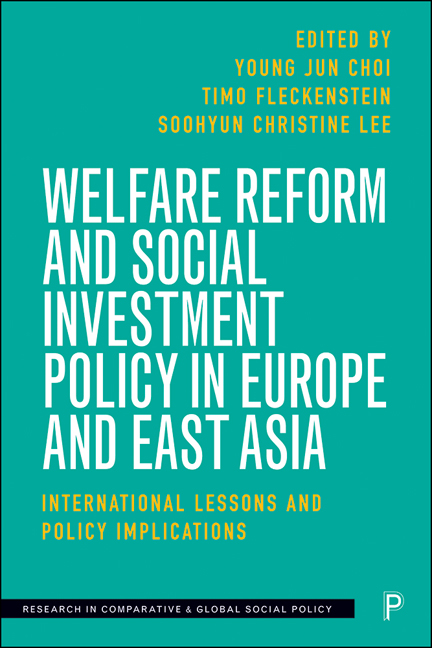 Welfare Reform and Social Investment Policy in Europe and East Asia
Welfare Reform and Social Investment Policy in Europe and East Asia Book contents
- Frontmatter
- Contents
- List of figures and tables
- Notes on contributors
- Acknowledgements
- Preface from the series editors
- 1 Introduction: social investments and welfare reform in Europe and East Asia
- 2 Work–family policy expansion and the idea of social investment: the cases of Germany, England, South Korea and Japan
- 3 Private education in South Korea: lessons for the West from past mistakes?
- 4 How do family background and shadow education affect academic performance and labour market outcomes in South Korea? Reasons for redistributive social investment
- 5 Employability, higher education and the knowledge economy
- 6 Does social investment make the labour market ‘flow’? Family policies and institutional complementarities in Italy, Spain, Japan and South Korea
- 7 The social investment approach and gender division of housework across East Asia and Europe
- 8 Employment outcomes of social investment in latecomer countries
- 9 Estimation of the human capital depreciation rate: an international comparison and policy implications in South Korea
- 10 Changing patterns of grandparenting and their implications for active ageing in England and South Korea
- 11 The governance of social investment policies in comparative perspective: long-term care in England and South Korea
- 12 Towards greater social investments and equality in Europe and East Asia: policies and politics
- Index
3 - Private education in South Korea: lessons for the West from past mistakes?
Published online by Cambridge University Press: 21 December 2021
- Frontmatter
- Contents
- List of figures and tables
- Notes on contributors
- Acknowledgements
- Preface from the series editors
- 1 Introduction: social investments and welfare reform in Europe and East Asia
- 2 Work–family policy expansion and the idea of social investment: the cases of Germany, England, South Korea and Japan
- 3 Private education in South Korea: lessons for the West from past mistakes?
- 4 How do family background and shadow education affect academic performance and labour market outcomes in South Korea? Reasons for redistributive social investment
- 5 Employability, higher education and the knowledge economy
- 6 Does social investment make the labour market ‘flow’? Family policies and institutional complementarities in Italy, Spain, Japan and South Korea
- 7 The social investment approach and gender division of housework across East Asia and Europe
- 8 Employment outcomes of social investment in latecomer countries
- 9 Estimation of the human capital depreciation rate: an international comparison and policy implications in South Korea
- 10 Changing patterns of grandparenting and their implications for active ageing in England and South Korea
- 11 The governance of social investment policies in comparative perspective: long-term care in England and South Korea
- 12 Towards greater social investments and equality in Europe and East Asia: policies and politics
- Index
Summary
Introduction
I had a chance to talk about private education with a Western researcher a number of years ago. For us it's a real headache, the private education. It's really serious and may be the most serious social problem… But the Western researcher, he kind of envied the Korean parents. They are willing to spend their money for their children, and that increases the level of human resources in the country, so what a desirable phenomenon! But that researcher doesn't understand this really serious social problem in Korea. (interview with a Korean National Assembly politician, February 2017)
Advocates of government social investment strategies across the world almost always highlight the critical importance for societies of spending on education. Developing human capital through education spending is often viewed as being almost a silver bullet for solving countries’ problems – boosting economic growth, promoting equality of opportunity and preventing ‘wasted talent’ among disadvantaged groups. At the same time, one typically neglected area of policy analysis relates to families’ simultaneous private spending on education, particularly in unequal societies, and the ways this spending may at times actually undermine key aims associated with the government's social investment efforts. Rather than reducing educational inequalities, these are often maintained through families’ private spending, as parents seek to ensure their children remain one step ahead of the game. Over time, problems of education overconsumption can arise which are suboptimal not only for growth but also for citizens’ wellbeing, even if they do drive apparently positive outcomes such as countries’ high performances in international education league tables. Where strong, long-term incentives exist in a society for families to buy private alongside public education, private tutoring industries can grow dramatically in size and can become very difficult for governments to regulate – again compromising many aims of public social investment. The quote above from a South Korean politician in 2017 highlights such problems in the context of one particular society – South Korea – where families’ private spending on ‘shadow education’ outside the formal school day is known to have reached a staggering 2.79 per cent of the national GDP in 2006 (Kim and Lee, 2010: 261).
- Type
- Chapter
- Information
- Welfare Reform and Social Investment Policy in Europe and East AsiaInternational Lessons and Policy Implications, pp. 61 - 84Publisher: Bristol University PressPrint publication year: 2021


